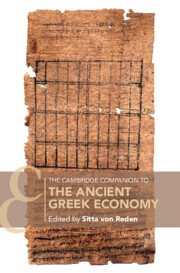Book contents
- The Cambridge Companion to the Ancient Greek Economy
- The Cambridge Companion to the Ancient Greek Economy
- Copyright page
- Contents
- Maps
- Notes on the Contributors
- Abbreviations
- Maps
- 1 Introduction
- Part I Diachronic Perspectives
- Part II Regional Perspectives
- Part III Structures and Processes
- 11 Population
- 12 Consumption, Nutrition, and the Grain Supply
- 13 The Agricultural Economy
- 14 The Non-Agricultural Economy: Artisans, Traders, Women, and Slaves
- 15 Markets
- 16 Money, Credit, and Banking
- 17 Dispute Resolution
- 18 Taxation and Tribute
- Part IV Networks
- Part V Performance
- References
- Index
- Cambridge Companions to the Ancient World
16 - Money, Credit, and Banking
from Part III - Structures and Processes
Published online by Cambridge University Press: 21 July 2022
- The Cambridge Companion to the Ancient Greek Economy
- The Cambridge Companion to the Ancient Greek Economy
- Copyright page
- Contents
- Maps
- Notes on the Contributors
- Abbreviations
- Maps
- 1 Introduction
- Part I Diachronic Perspectives
- Part II Regional Perspectives
- Part III Structures and Processes
- 11 Population
- 12 Consumption, Nutrition, and the Grain Supply
- 13 The Agricultural Economy
- 14 The Non-Agricultural Economy: Artisans, Traders, Women, and Slaves
- 15 Markets
- 16 Money, Credit, and Banking
- 17 Dispute Resolution
- 18 Taxation and Tribute
- Part IV Networks
- Part V Performance
- References
- Index
- Cambridge Companions to the Ancient World
Summary
From the late archaic period, all the functions of money – medium of exchange, measure of value, store of value, and medium of payment – were performed by coins, almost always silver, struck by scores of states on a few different weight standards. Market trade, international commerce, and labor were all mediated by money. Finance was an important, and often decisive, factor in statecraft and warfare, and temples were both dependent upon and replete with silver and gold. Agriculture was less monetized; cultural effects are still being debated. Credit was an essential part of both friendship and business: mortgages and eranoi (joint loans by an ad hoc group of lenders) supplied extraordinary personal expenses, while small market loans and larger bottomry loans for overseas expeditions financed both large and small commerce. Banking, in the sense of investing depositors’ money, was a Greek invention. Athenian banks, always family businesses, provided credit, remote payments, money-changing, and a secure place to hide money. Ptolemaic royal banks managed royal revenue and were involved, alongside private bankers, in the local economy; cashless book-transfers were common. The scope of banking was, however, limited by the need for coin reserves, which kept the banks from dominating the economy.
Keywords
- Type
- Chapter
- Information
- The Cambridge Companion to the Ancient Greek Economy , pp. 237 - 249Publisher: Cambridge University PressPrint publication year: 2022

